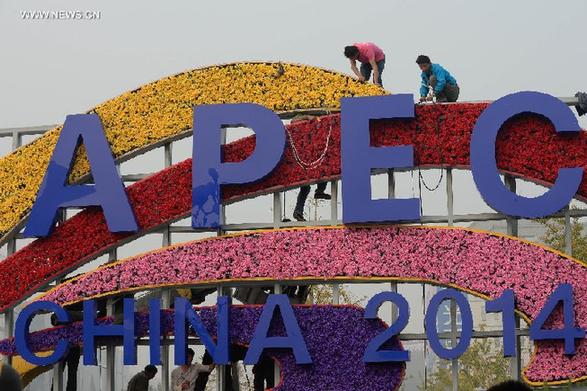The time Is right for an APEC community
- By Wang Yusheng
 0 Comment(s)
0 Comment(s) Print
Print E-mail China.org.cn, November 2, 2014
E-mail China.org.cn, November 2, 2014
This year marks the 25th anniversary of the founding of the Asia-Pacific Economic Cooperation forum and is the second time that China will play host to the APEC leaders summit meeting.
|
|
|
Workers set up a flower decoration for the upcoming APEC meeting in Xidan of Beijing, China, Oct. 25, 2014. The APEC Economic Leaders' Meeting will be held in Beijing from Nov. 10 to 11. The APEC leaders' week also includes the final senior officials' meeting from Nov. 5 to 6 and the 26th ministerial meeting from Nov. 7 to 8. [Photo: Xinhua/Yin Dongxun] |
China joined the APEC as a sovereign state in 1991, while Hong Kong and Taiwan joined the forum as member economies. China and APEC are inextricably linked. An APEC without China would not be worthy of its name, while China can’t do without APEC either.
Within the APEC forum, China has always been an equal partner and followed, defended and adhered to the basic principles of APEC. The principles also are the distinctive values of the APEC, namely, equal partnership, volunteerism, consensus building, openness and inclusiveness. APEC has strong and powerful members, but the forum has never categorized its members by their size and strength, and will never do so.
To further the commitment of APEC leaders to deepen the spirit of community in the Asia-Pacific region and work out two timetables for the Bogor Goals (trade and investment liberalization and facilitation), China has played a positive role in coordination; upheld the pragmatic and mutual-benefit principles; firmly opposed bullying by any power; and defended and safeguarded the interests of its members. And China has also played a positive role in steadily promoting trade and investment liberalization among APEC members.
In the past decade, international geopolitics and economics have undergone profound changes, reflected in APEC’s development. Despite various challenges and obstructions, however, APEC continues to stick to a shared vision and values — equal partnership, volunteerism, consensus building, openness and inclusiveness, trade and investment liberalization, and facilitation. And furthermore, APEC has also deepened its principles and values along with the changing times.
In the past two decades, APEC has made the following remarkable achievements:
First, at the Seattle meeting in 1993, the leaders committed to deepening the spirit of community in the Asia-Pacific region. It was a political guide for the direction of APEC’s development. At that time, however, due to premature conditions, many members, including China, did not have a good understanding of its importance and historical significance, and the idea of community championed by the United States failed to materialize. But now, the times have changed, and it is necessary to apply and deepen the initiative, which will be of enormous vitality and is line with the times.






